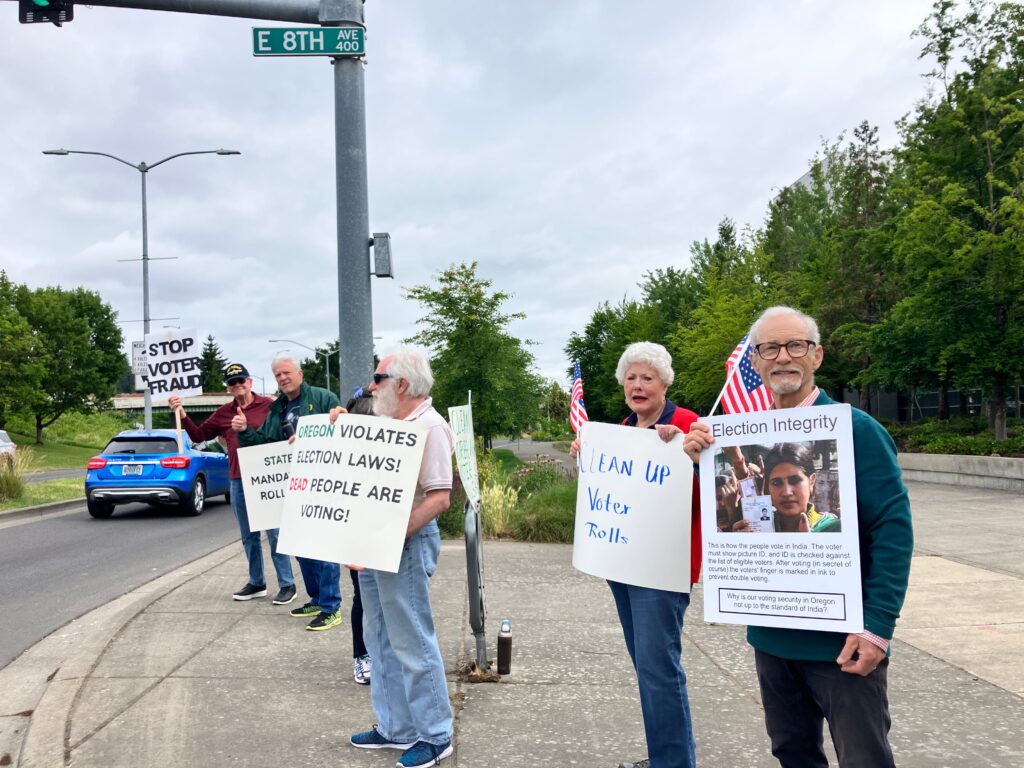A federal judge in Oregon pointed out Wednesday that the conservative activist group Judicial Watch faces “an uphill battle” in challenging the state’s management of its voter rolls.
Judicial Watch’s similar suits alleging a state has failed to remove ineligible voters have been dismissed by the 9th Circuit Court of Appeals because the group either lacked the right to challenge the rolls or failed to show a concrete harm suffered.
Judicial Watch’s lawyer Robert Popper conceded he cannot cite one ruling in the 9th Circuit, which covers nine states and two territories, that has allowed the group’s challenge of voter registration lists to proceed.
In Oregon, the group claims the secretary of state has failed to make a “reasonable effort” to remove voters who have moved or died and failed to provide requested public voter records.
Instead, Popper referenced a case in Colorado, in a separate appeals court jurisdiction, where Judicial Watch has a complaint pending. A U.S. District judge there, he said, granted Judicial Watch standing based on “diminished voter confidence” in the state’s voter roll system.
Judicial Watch, the Constitution Party of Oregon and two Oregon residents allege the same thing about Oregon’s elections, arguing that “so few Oregon counties appear to be complying with the National Voter Registration Act.”
The state’s lawyer urged McShane to throw out the civil suit by the groups, saying the groups haven’t shown the state has harmed them. Their complaint is filled with “generalized grievances that are too abstract,” said Senior Assistant Attorney General Brian Simmonds Marshall.
Marshall noted that the inactive voters identified by the state don’t receive ballots.
At the end of the nearly hourlong hearing in Eugene, McShane said he would rule in a few weeks.
The hearing drew about 30 people, many from the Lane County Republican Party. They wore red-white-and blue sweatshirts and hats and T-shirts decorated with the U.S. flag. Near the end, McShane told those in the public gallery to remove their hats, one of the court’s rules of decorum.
The National Voter Registration Act requires state governments to offer simplified voter registration processes for any eligible person who applies for or renews a driver’s license or applies for public assistance.
According to Oregon’s secretary of state, if county officials learn a voter has moved or died, they must update the registration record, including sending a notice to the voter. The county must keep the notices for two years.
The county clerk considers the registration “inactive” until it’s updated, canceled or the clerk decides it should be active again.
Clerks can cancel registrations when a voter dies, when a voter requests cancellation, when the clerk has “written evidence” that the voter registered to vote in another state or when two general elections have passed since the clerk sent a notice and the voter hasn’t voted or updated their registration, according to the state.
Judicial Watch contends that Oregon data shows that 29 Oregon counties with a combined total of 2.4 million voter registrations removed a total of 36 registrations over a two-year reporting period, with 19 of these counties reporting zero such removals.
The Constitution Party of Oregon, which advocates for limited government and promotes individual liberties, also argued that its members have had to spend more time and money sorting through the state’s voter registration rolls when doing the party’s voter outreach.
Marshall responded that the federal law was “not created for voter outreach but to conduct federal elections.”
In addition to alleging sloppy record-keeping, the groups say the state has failed to produce voter lists when requested under public records law.
Marshall countered that the Secretary of State’s Office received an Aug. 4, 2023, letter from Judicial Watch that requested seven categories of voter roll documents. The next month, a support desk analyst replied to Judicial Watch, estimating that providing the names and addresses of each Oregon voter who received a registration confirmation notice and their responses to the notice would require 5,000 hours of work to complete. The state said it would charge $25 for each hour of work.
Judicial Watch didn’t respond to the email and later sued the state, Marshall said.
“There was no refusal to provide them,” he said. “There was a cost estimate provided and no further dialogue.”
McShane asked why he shouldn’t consider it a “little suspicious” that perhaps Judicial Watch was “maybe manufacturing” a public records violation by not responding to the state.
Popper called the state’s cost estimate of about $180,000 “beyond anything we ever paid for.”
“We submit requests all over the country and a lot of the time they’re provided for free,” he said. “A thousand dollars we consider expensive.”
Marshall said that Judicial Watch had never complained about the cost directly to the Secretary of State’s Office.
He said the state is operating with a 25-year-old voter registration database that “does not do well with modern technology” and requires a “great deal of hands-on work” to extract requested records.
Further, the state would have needed to redact certain confidential voter information, such as that of senior government officials and victims of domestic violence, he said.
Earlier this month, the U.S. Department of Justice filed a limited statement of interest in the case, stressing that the state of Oregon, not its counties, are responsible for maintaining its voter roll records under federal law.
— Maxine Bernstein covers federal court and criminal justice. Reach her at 503-221-8212, mbernstein@oregonian.com, follow her on X
@maxoregonian
, on Bluesky
@maxbernstein.bsky.social
or on
LinkedIn
.





More Stories
Oregon voter roll lawsuit faces uphill battle in federal court, judge says
Oregon voter roll lawsuit faces uphill battle in federal court, judge says
Oregon voter roll lawsuit faces uphill battle in federal court, judge says